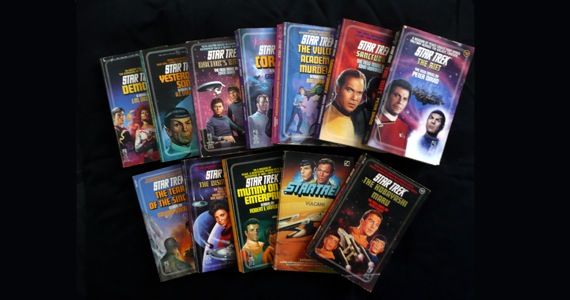Spinning out of my ongoing fascination with the idea of canon - both "official" and personal - my attention wanders back to expanded universe spin-offs from long-running franchises. What happens when the original source material is overwhelmed by the peripheral?
What has me so obsessed with spin-off material are Star Trek novels, I have to admit. After devouring (re-devouring?) all of Star Trek: Deep Space Nine in a three month period on Netflix last year, I found myself filling the DS9-shaped hole in my heart with Pocket's "relaunch" novels, only to find that… they were actually pretty good. Some, in fact, were pretty great, and I have the sneaking suspicion that Unity, the series' first equivalent to a season finale in terms of ongoing plots and character arcs, may actually have been more fulfilling to me than "What You Leave Behind," the final episode of the television show proper. After that discovery - as well as the realization that Trek books on the whole were short and fast enough reads to be perfect to use as a way to relax and decompress after a day of work - I was off, racing through more fiction set post-The Next Generation, Voyager and DS9. In the Destiny series, I enjoyed the origin (and an end, maybe) of the Borg, in the Typhon Pact series, I loved the new Cold War setting for the franchise… This was all fun stuff for a part-time Trekkie (Sorry, "Trekker" sounds weird to me) like me.
But at some point, I found myself thinking: Haven't there been more Trek novels than actual episodes of the television series? The answer turns out to be yes, if you look at the original series alone (The same isn't true for the spin-offs). There have definitely been more Trek comics than television episodes; the same is true of Star Wars novels and comics than original movies. With the ongoing success of Dark Horse's Buffy comics, we're likely to hit the point where there have been more comics than episodes of that show before too long, too, and the same with Angel if we're not already there.
These days, in fact, such high-profile media franchises exist almost solely in expanded universe spin-offs and merchandise. Where else can you find Buffy if not in comics, after all? Outside of The Clone Wars television show, where are the other Star Wars stories, if not the novels and the comic books?
This isn't a bad thing, by any stretch of the imagination; the tie-in media keeps fandom fed, but also manages to keep them hungry for "the real thing," too - Consider the role the comics, novels and audio plays played in maintaining Doctor Who and demonstrating the consistent awareness and interest to the BBC, giving it the confidence to commission Russell T Davies' television revival, after all, or the success of JJ Abrams' Star Trek reboot a few years back. But, at the same time, there comes a point where the spin-off material becomes the source material, surely?
For example, Firefly and Serenity is only likely to exist as a Dark Horse comic book now. For the faithful Browncoats who want more of that world, that's the only place they're going to get it, and so whatever it established there has a legitimacy that, say, Marvel's 1970s Star Wars comic book could only have hoped for. Similarly, anyone who hankers for the future of Jean-Luc Picard and the crew of his particular Enterprise will have to rely upon the veracity of the novels for updates, because not only are we unlikely to see new TV shows or movies featuring the character, but he's potentially been wiped out of movie continuity altogether thanks to the 2009 reboot of the franchise.
Officially, all of these spin-off products aren't "real"; they can - and in some cases, will - be ignored by those who own the franchises they come from, and get to pick and choose what "counts" and what doesn't. But when they're the majority of the (or even the only) new material that's actually around, doesn't that make them the real thing by default?

